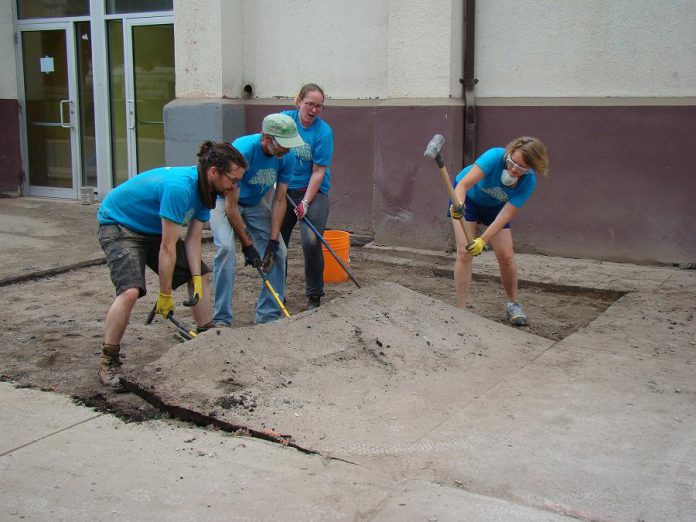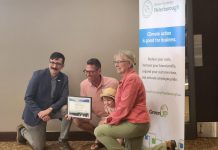
One of the final steps when a new building is constructed is the paving of the parking lot. Heavy equipment is brought in and a thick layer of asphalt is laid down, creating a smooth surface for vehicles.
While paving is good for drivers, it does have drawbacks for the environment. Water, which once was able to freely soak into the ground, now has nowhere to go. This water ends up as storm water and flows into the nearest catch basin. While this doesn’t seem like a big problem, it does have some very negative impacts on the environment.
Storm water is the rain or snow that falls on cities and towns and eventually washes into our storm drains. Along the way it picks up a host of toxic chemicals, bacteria, and contaminants. Think about everything you find on the pavement: oil and grease, pet waste, litter, salt in winter. These elements all mix with the water that then flows through our drains — untreated — back into rivers and lakes. Once in larger bodies of water, these contaminants can have a negative impact on aquatic species, birds, and fish.
Another negative implication of storm water can be flooding. During heavy rain and thunderstorms, water with no place to go can quickly overwhelm storm drains and cause flooding. With fewer paved surfaces, some of this water could soak into the ground, preventing or reducing the severity of these urban flooding events.
2014 marks the 10th anniversary of the Peterborough flood. While we never want such an event to happen again, it’s entirely possible the city will experience flooding in the years ahead. Reducing paved areas and replacing them with permeable surfaces, which allow rainwater to soak into the ground, can lessen our flooding risk.
Locally, GreenUP has been busy working on the issue of storm water for the past few months and we kicked off our efforts on Monday, June 23th. The organization has been selected to implement a new project called “Depave Paradise”. The project is centered on removing asphalt, creating more green space, and reducing storm water runoff. Peterborough’s Depave Paradise site is located at the Brock Mission at 217 Hunter Street.
The section GreenUP is working on is located along the front of the building and extends towards the street as far as the sidewalk. This key location will help to reduce the amount of water flowing from around the building out to the street and down a slope to the closest storm drain.
On Monday, crews from Mortlock Construction were at the site slicing the pavement into manageable chunks for removal on Tuesday. Volunteers put in many hours of labor lifting and removing the pavement, exposing the soil underneath. On Tuesday, the planting volunteer team was on site, digging up the compacted soil, adding compost, and putting native plants, trees, and shrubs into the ground. The result, when finished, will be a beautiful green space for the entire neighbourhood to enjoy.
Removing asphalt and concrete at the neighbourhood level is an exciting new trend that renews neglected urban spaces. The hands-on depaving process captures the hearts and energies of community members who work together to make their surroundings more livable. Depave Paradise demonstration projects make permanent positive changes to neighborhoods and encourage others to consider depaving on their own.
Removing unneeded pavement has other benefits, outside of reducing the amount of storm water runoff. Water that soaks back into the ground will recharge underground aquifers, ensuring more clean drinking water for us all to enjoy. The plants that replace the pavement absorb carbon dioxide, cleaning our air and the green space created has been proven to be good for mental health.
Similar successful initiatives have taken place across Ontario and in the United States. More information is available online at www.depaveparadise.ca.
Depave Paradise is in partnership with GreenUP, the Brock Mission, Green Communities Canada, Intact Insurance, RBC Blue Water and TD Friends of the Environment with support from the City of Peterborough, Mortlock Construction, Drain Brothers Construction, and the Night Kitchen.
For more information about Depave Paradise, get in touch with Alix Taylor at 745-3238 x208 or by email at alix.taylor@greenup.on.ca.
Depaving Peterborough
All photos courtesy of Peterborough GreenUP



























